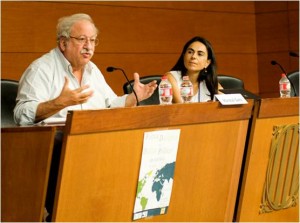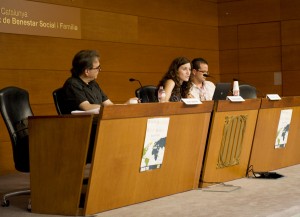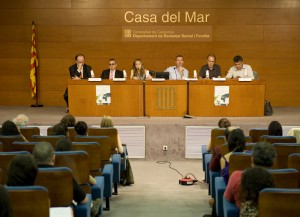Marshall Ganz: “When hope meets critics and the will becomes effective action in a community organisation, transformation occurs (…). It is not the result of one person or one party”
Dr. Marta Soler, director of CREA opened the conference introducing Dr. Marshall Ganz. The autor, professor at Harvard’s Kennedy School of Government, gave the lecture Leading change: reconnecting people and policies in the context of the Conference Dialogic Politics. Making effective democracy, last 4rth of July at the Casa del Mar in Barcelona. The conference has been organised by CREA-UB in the framework of the INCLUD-ED project from the 6th Framework Programme of European Research and with the collaboration of the Fundació Jesús Gómez.
It was the first time that Ganz was in Catalonia and he presented a way of doing politics for and with citizenship. This statement led him to achieve a victory with the Obama campaign that enabled for an African American to become President of the United States of America. Marshall Ganz exposed the keys of the political and social organizing which mobilised millions of people in this campaign. Ganz had acquired a profound knowledge of the social and political organizing, devoting himself intensely to the north-American civil rights movement with Martin Luther King and César Chávez, which led him to become a professor at Harvard. His presence has offered us an ideal opportunity to share with him scientific ideas and reflections that contribute to improvements in of our country in a key moment, where the need of including into politics, an increasingly critic and participative citizenry, becomes urgent.
A fist round table was held on Politics and citizenry: Contributions from research. This space counted on the interventions of Dr. Teresa Sordé, Sociology professor at the Universitat Autònoma de Barcelona who worked with Ganz during the time at Harvard where she did her PhD; and with Professor Dr. Joan Subirats from the Dept. of Political Science and Public Law in the same university. Teresa Sordé presented the concept of dialogic politics, highlighting the relevance of the Social Sciences in the contributions of the evidence scientifically contrasted in the analysis of the relationship between the citizenry and politics, overcoming assumptions and identifying successful actions that lead to social transformation. Joan Subirats brought to the debate the need for an analysis which includes the role of social networks in a new way of doing politics, as it has been evidenced in movements such as the 15-May in Spain and the Arab upraising.
To end up the conference, the second round table Politics and Citizenry; Reflections from practice, conducted by Dr. Lídia Puigvert professor of sociology in the University of Barcelona, was organised with the participation of the following members of the Catalan Parliament: Josep Maria Llop (CIU), Jaume Collboni (PSC), Pedro Chumilla (PPC) and Oriol Amoros (ERC), and the President of the municipal group of ICV-EUIA at Barcelona’s City Hall. A common point among the reflections they put forward was the need to create more channels of dialogue with citizenry.



